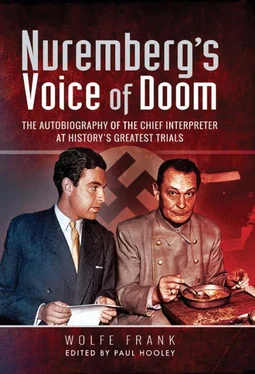
NUREMBERG’S VOICE OF DOOM
The Autobiography of the Chief Interpreter at History’s Greatest Trials
First published in Great Britain in 2018 by Frontline Books,
an imprint of Pen & Sword Books Ltd, Yorkshire – Philadelphia
Copyright © Wolfe Frank and Paul Hooley
ISBN: 978-1-52673-751-9
eISBN: 978-1-52673-752-6
Mobi ISBN: 978-1-52673-753-3
The right of Wolfe Frank and Paul Hooley to be identified as Authors of this work has been asserted by them in accordance with the Copyright, Designs and Patents
Act 1988. A CIP catalogue record for this book is available from the British Library All rights reserved.
No part of this book may be reproduced or transmitted in any form or by any means, electronic or mechanical including photocopying, recording or by any information storage and retrieval system, without permission from the Publisher in writing.
Also by Paul Hooley
From Lockington to Gillingham
One Foot In The Grave
Pen & Sword Books Ltd incorporates the imprints of Pen & Sword Archaeology, Atlas, Aviation, Battleground, Discovery, Family History, History, Maritime, Military, Naval, Politics, Social History, Transport, True Crime, Claymore Press, Frontline Books, Praetorian Press, Seaforth Publishing and White Owl
For a complete list of Pen & Sword titles please contact:
PEN & SWORD BOOKS LTD
47 Church Street, Barnsley, South Yorkshire, S70 2AS, UK.
E-mail: enquiries@pen-and-sword.co.uk
Website: www.pen-and-sword.co.uk
Or
PEN AND SWORD BOOKS, 1950
Lawrence Roadd, Havertown, PA 19083, USA
E-mail: Uspen-and-sword@casematepublishers.com
Website: www.penandswordbooks.com
Sir Norman Birkett, the Alternate British Member of the International Military Tribunal (IMT) at Nuremberg.
The Undercover Nazi Hunter: Unmasking Evil in Post-war Germany is to be published by Frontline Books during 2019.
The Third Reich (Realm) is the name given to that period of German history under the dictatorship of Adolf Hitler through the Nazi Party (1933–1945). The First Reich was the period known as the Holy Roman Empire (962–1806) and the Second Reich the German Empire (1871–1918).
R.W. Cooper, The Nuremberg Trial.
Rear Admiral Michael Angelo Musmanno (1897-1968) was the Presiding Judge at the Einsatzgruppen Trial (see Plate 2). He had served in the military justice system of the US Navy during the Second World War and then as a governor of an occupied district of Italy before becoming a trial judge at Nuremberg. In the judgement of the Einsatzgruppen Trial, Judge Musmanno wrote: ‘One reads and reads these accounts of which here we can give only a few excerpts and yet there remains the instinct to disbelieve, to question, to doubt. There is less of a mental barrier in accepting the weirdest stories of supernatural phenomena, as for instance, water running up hill and trees with roots reaching toward the sky, than in taking at face value these narratives which go beyond the frontiers of human cruelty and savagery. Only the fact that the reports from which we have quoted came from the pens of men within the accused organizations can the human mind be assured that all this actually happened. The reports and the statements of the defendants themselves verify what otherwise would be dismissed as the product of a disordered imagination.’
The Einsatzgruppen Trial (officially, The United States of America v Otto Ohlendorf, et al.) was the ninth of the twelve SP trials. The Einsatzgruppen (task forces) were Schutzstaffel (SS) paramilitary death squads of the Nazis. They were responsible for the murder of much of the intelligentsia, including members of the priesthood, and they played an integral role in the implementation of the so-called ‘Final Solution to the Jewish Question’. In the opening statement of the trial the prosecution stated: ‘The judgement of the IMT declared 2 million Jews were murdered by the Einsatzgruppen and other units of the Security Police. The defendants in the dock were the cruel executioners, whose terror wrote the blackest page in human history. Death was their tool and life their toy. If these men be immune, then law has lost its meaning and man must live in fear.’
Rudolf Aschenauer (1913-1983) was a German lawyer who became known as a ‘criminal defendant in war crimes and Nazi trials’. Aschenauer represented hundreds of accused war criminals, including Otto Ohlendorf in the Einsatzgruppen Trial. The address to which Judge Musmanno was referring (in note 4 above) and which caused Wolfe Frank to consider and then resign his position as Chief Interpreter was no doubt Aschenauer’s opening statement on behalf of Otto Ohlendorf (the defendant whose boasts and admissions under his interrogation Frank had found to be perhaps the most harrowing of all he heard and translated at the Nuremberg Trials). ‘Mr President! High Tribunal!’ Aschenauer had begun, ‘after submission of the documents on the part of the prosecution in the Case of the United States versus Ohlendorf et aI. it will be the task of the defence to make their comments concerning the documents themselves. The defence will be able to point out errors, to make clear to the Tribunal points which are contradictions in themselves, thus destroying in some cases the value the documents possess as evidence, as well as reducing the value of the entire evidence brought forth by the prosecution’. Aschenauer’s plea may have delayed proceedings, however in the end it made no difference in Ohlendorf’s case, he was convicted of crimes against humanity and war crimes committed during the Second World War. He was sentenced to death and hanged at the Landsberg Prison in Bavaria on 7 June 1951.
The ‘Subsequent Trials’ (ST) or more commonly ‘Subsequent Proceedings’ (SP) – formally the Trials of War Criminals before the Nuremberg Military Tribunals – were a series of twelve US military tribunals for war crimes against members of the leadership of Nazi Germany other than those tried by the IMT (Note 5). The SP, like the IMT, were also held in the Palace of Justice.
The Nuremberg Trials were the military tribunals held by the Allied forces after the Second World War. The trials were the prosecution of prominent members of the political, military, judicial and economic leadership of Nazi Germany, who planned, carried out, or otherwise participated in the Holocaust and other war crimes. They were held within the Palace of Justice in Nuremberg, Germany. The first and most high profile of the trials were those of the major war criminals (Goering and other leading Nazis). Held before the International Military Tribunal (IMT), they were described as being ‘the greatest trial in history’ by Norman Birkett, one of the British judges who presided over them. Held between 20 November 1945 and 1 October 1946 the IMT tried twenty-four of the most important political and military leaders of the Third Reich.
On 20 July 1944, a plot by senior German military officials to murder Adolf Hitler and take control of his government failed when a bomb planted in a briefcase went off but did not kill the Nazi leader. Hundreds of people thought to be involved in the conspiracy were arrested and brought before the Nazi People’s Court – around 200 were executed.
Читать дальше













